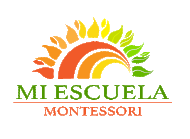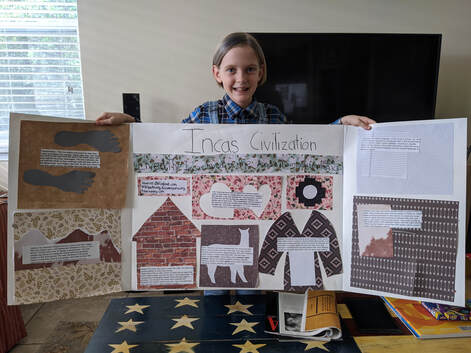-
About Us
- Apply
- Inicio
- Aplica
-
Parents/Padres
- Parent Liaison
- Attendance/Tardy
- Políticas/ Policies
- Uniformes/ uniforms
- Programa de Alimentos/Food Program
- Autobús/ Bus Information
- Materiales/Supplies
- Carline
- Store/Tienda
- Boletin/Newsletter
- Bullying
- Teachers Out of Field
- Media Services and Technology
- Curriculum
- Enrollment Paperwork Checklist
- Summer Work
- Support Us
- Calendar
- Staff Resources
- Blog
The Age of ReasonDuring the elementary school years, students have an increased focus on social development. Cooperative and/or peer-supported learning are essential elements of the elementary program. Elementary children have an immense appetite for knowledge and are capable of great effort and concentration. They have an increased ability to tell fact from fiction, to reason, to problem solve. The elementary child does not want to be given answers but, rather, wants to be given the tools to be able to discover things on his or her own. Within the elementary classroom, students have opportunities to develop their research minds, which helps them answer life’s big questions.
|
|
The Elementary Program
|
There are two levels in the elementary program, Lower Elementary (grades 1–3) and Upper Elementary (grades 4–6). Classes are dual language, with alternating instructional days in English and Spanish. Each classroom is led by two Montessori trained guides, one of whom instructs in Spanish and the other of whom teaches in English.
*****Due to the specific challenges of beginning a dual language program for English dominant students with no exposure to Spanish in third grade, in its first two years, Mi Escuela Montessori will have a transitional program:
|
The Elementary Curriculum
In the early elementary weeks, students are introduced to the Five Great Lessons, which form the framework of the work they will do for the next 8 years. According to Paula Polk Lillard, “Montessori stated that for the elementary child, ‘the power of imagination is what educates.’ The facts of these stories represent the truths of the universe (and the progression of human civilization) as we know them, but they appeal to the child’s imagination to comprehend those facts and their meaning.” The Five Great Lessons give students enough information to spark further interest and provide a context around which to organize the knowledge they accumulate. Continually revisited and extended throughout grades 1–8, the Great Lessons provide students with a big picture that integrates study across multiple subjects and demonstrates the interconnectedness of science, history, language, and math.
|
Great Lesson 1: The Story of the Creation of the Universe provides a foundation for explorations in physical and earth/space science. It describes how minerals and chemicals formed from elements; how matter transforms to three states of solid, liquid, and gas; how particles joined together and formed the earth; how heavier particles sank to the earth’s core and volcanoes erupted; how mountains were formed; and how the atmosphere condensed into rain, creating oceans, lakes, and rivers. Students are introduced to lessons in astronomy, chemistry, geology, geography, meteorology, and physics.
|
|
Great Lesson 2: The Story of the Coming of Life tells the story of life on Earth and introduces students to biology. A timeline accompanies the story, on which the teacher indicates when vertebrates, fish, plants, amphibians, reptiles, birds and mammals began. Students are introduced to lessons in ancient life/anthropology, biology, botany, ecology, and zoology.
|
|
Great Lesson 3: The Timeline of Humans and Civilization introduces humans, presents a picture of what life was like for early humans, and extends that understanding to the current day. Students are given analytic tools to learn about and compare cultures; they study the fundamental needs of humans and explore how factors such as climate and topography influence culture. Students are introduced to lessons in culture, history, civics/social studies, and discovery and invention.
|
|
Great Lesson 4: The Story of Communication in Signs acknowledges the human invention of writing and introduces children to the wealth of literature created over the ages. It encourages participation in the creation of written language. Students are introduced to language, reading, structure, and writing. Within the context of the Story of Communication in Signs, the Montessori curriculum stresses the interrelatedness of oral language, reading, and writing and promotes an integrated approach with every other curriculum area. MEM uses the ARC reading curriculum framework to establish a system of practices and routines aimed at developing a growth-mindset and building competency in all areas of Language Arts and content areas across English and Spanish.
|
|
Great Lesson 5: The Story of Numbers Through Time impresses upon students the human invention of numbers. This story is the basis for the study of mathematics, which is integrated across all studies. Students are introduced to lessons in applications/operations, geometry, mathematics, and numbers. Students utilize the Montessori materials to explore mathematical concepts in a concrete form before reaching a level of abstraction. The Montessori curriculum addresses M.A.F.S. objectives, with a particularly strong and effective emphasis in the areas of Number Sense, Operations, and Geometry. Supplementary materials are used to fully address Algebraic Thinking, Probability and Data Analysis. Students have access to a 5-year continuum within one classroom, with greater chances for students to review previous learning and connect to newly introduced concepts.
|
|
Ready to apply? Find out information how to apply to our charter school program.
|
|
Heartland Crime Stoppers provides cash awards for anonymous information regarding crimes occurring in Polk, Highlands and Hardee Counties. Report a crime by calling 1-800-226-8477
|
© 2020 Mi Escuela Montessori. All rights reserved.
-
About Us
- Apply
- Inicio
- Aplica
-
Parents/Padres
- Parent Liaison
- Attendance/Tardy
- Políticas/ Policies
- Uniformes/ uniforms
- Programa de Alimentos/Food Program
- Autobús/ Bus Information
- Materiales/Supplies
- Carline
- Store/Tienda
- Boletin/Newsletter
- Bullying
- Teachers Out of Field
- Media Services and Technology
- Curriculum
- Enrollment Paperwork Checklist
- Summer Work
- Support Us
- Calendar
- Staff Resources
- Blog







